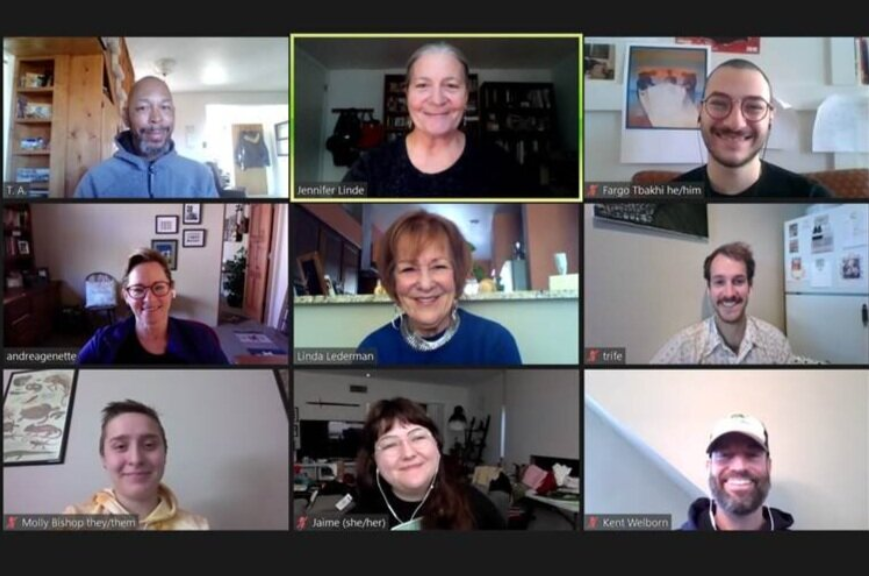When the COVID-19 pandemic canceled in-person gatherings indefinitely, it became clear to the faculty at Arizona State University's Hugh Downs School of Human Communication that it would require both creativity and imagination to find a way to bring its performances to an audience.
Showing a passionate commitment to solving this challenge, the school shifted its perspective to see possibilities instead of obstacles.
Many public performances took place at the school’s creative black box theater, The Empty Space, located on the Tempe campus. For decades, students and faculty have written, performed and directed creative scholarship in this public venue.
“Our Performance Studies program views performance as a fundamental part of the way human beings communicate,” said Jennifer Linde, artistic director of The Empty Space. “Nothing can recreate live performance. Performance puts the body front and center as a key to unlocking self, identity and the power of communication.”
The challenge, said Linde, was to take the “publicness” of the work in The Empty Space and continue to create the joy of live performance remotely.
Accepting the challenge was a group of faculty and students from the Hugh Downs School who came together to create “Pathways of Recovery,” a virtual live performance followed by facilitated participation in Storyscope story circles. Audience members may choose to join the discussion to share their own stories about themes revealed in the performance.
Register for “Pathways,” which will be performed at 5 p.m. MST, Saturday, Feb. 13.
“Rather than focus on the restraints, we chose to see this as an opportunity, as any good innovator will do,” said Professor Linda Lederman, on whose writings about alcoholism and recovery the performance is based.
“In many ways, this new format better lends itself to collaboration,” Lederman said. “We are also able to reach a wider audience. The live performance will also be recorded, accessible to anyone with the technology. Through this new performance project, I have been given the opportunity to further advance and gain exposure to my work's commitment to destigmatizing alcoholism and recovery.”
The 40-minute performance will portray the lived experiences of four characters who have been in recovery from alcoholism, many of them for a long time. The stories are based on discussions Lederman gathered over the years.
“Linda’s manuscript is a creative nonfiction based on actual interactions she had with people and fictionalized into stories of recovery,” Linde said.
Former Hugh Downs School student Molly Bishop was brought on board to write an adaptation of Lederman’s manuscript. The cast is comprised of former students and graduate colleagues of Linde’s. Current Hugh Downs School doctoral students have assisted with the production and Storyscope facilitation.
Linde has noticed, however, that virtual performances do have their restrictions when it comes to staging.

A Zoom rehearsal for "Pathways" with Jennifer Linde at the top middle and Linda Lederman in the middle of the second row.
“It’s been tough because the scenes are very different. One takes place at a recovery meeting and another at a coffee shop. At other times, the characters are talking together after a meeting, but in the virtual setting, they are in separate places,” Linde said.
The virtual performance marks the launch of The Recovery Communication Project (TRCP), an outgrowth of the research and work of Lederman, who studied both how college students drink (college drinking), and the separate but related issue of recovery from the disease of alcoholism. “Pathways” is part of Lederman’s most recent work of people of all ages who are in recovery, and the impact of storytelling and personal narratives on their recovery.
Before joining the faculty at ASU in 2006, Lederman was a professor of communication at Rutgers University for more than 25 years, a member of the faculty of the Rutgers Center for Alcohol Studies and founding director of the Rutgers Center for Communication and Health Issues, one of the first research groups in the nation to study the role of communication in alcohol use and abuse.
She is nationally recognized for her use-inspired research on alcohol-abuse prevention, alcoholism and collegiate recovery, which has been funded by grants from federal agencies totaling more than $8 million. Her 14 published books include “Changing the Culture of College Drinking” and “Voices of Recovery from the Campus,” a collection of stories from people who began their recovery while undergraduate students.
Lederman hopes that performances like “Pathways of Recovery” will add to the voices of recovery — creating a new wave of understanding that alcoholism is a disease, not a disgrace.
“Through open and honest communication with others who understand addiction, recovery can happen, recovery does happen, and recovering alcoholics lead happy and fulfilled lives, free from the bondage of addiction,” Lederman said.
More Arts, humanities and education

ASU graduate education programs are again ranked among best
Arizona State University’s Mary Lou Fulton College for Teaching and Learning Innovation continues to be one of the best…
ASU FIDM students to see their designs on the runway at Uncertainty Fashion Showcase
Nola Hill is perfecting every stitch of her fashion design collection, which she started conceptualizing last summer.She is among…

ASU+GSV Summit brings experts together to discuss innovation in education
This week, Arizona State University President Michael Crow and other university leadership joined education and learning experts…


